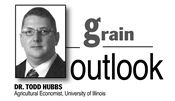Slight Changes To USDA WASDE Report In June

The USDA's June WASDE report of world supply and consumption projections contained a number of changes from the May report for corn and soybeans. The bulk of the changes related to world production estimates in the 2016-17 crop year. The estimates and forecasts from the report confirm a continuing trend of increasing soybean stocks and decreasing corn stocks over the next marketing year. These numbers will likely take a back seat to the developing crop prospects over the short run. The release of the Grain Stocks and Acreage reports on June 30 will provide major implications for the remaining marketing year and new crop prices moving forward.
For corn, the USDA made no changes to the estimates for the current U.S. marketing year. Year ending stocks estimates came in at 2235 million bushels. The pace of current marketing year export and domestic use suggest the ending stocks estimate will go unchanged. The marketing year average price is set in a range between $3.25 and $3.45. No changes occurred in the projections of production and consumption for the 2017-18 marketing year. Stocks on September 1, 2018 are projected at 2110 million bushels and the average farm price for the year ahead is forecast in a range of $3.00 to $3.80.
The estimated size of the 2017 Brazilian corn crop increased 39.4 million bushels to a record level of 3819 million bushels. Early harvest of second crop corn indicates yield 3 to 5 percent higher than the five-year average. Corn production projections for the 2017-18 marketing year in Brazil indicate a decrease to 3.7 billion bushels. Argentinian corn production estimates for 2016-17 stayed the same as last month. 2017-18 marketing year projections currently equal 2016-17 production estimates of 1.57 billion bushels. World production projections for 2017-18 decreased approximately 0.2 percent from May forecasts to 40.6 billion bushels on decreased corn production forecasts in Canada and the European Union. The world ending stocks projection lowered slightly to 7650 million bushels for the 2017-18 marketing year and is down 1191 million bushels from current marketing year estimates.
For soybeans, the USDA lowered the soybean crush projection by 15 million bushels for the current U.S. marketing year. The pace of domestic crush through April suggested weakness in domestic use. Soybean oil consumption estimates for the 2016-17 marketing year domestic use decreased by 100 million pounds on lower food, feed, and industrial use and soybean meal domestic use decreased 350 thousand short tons in confirmation of the reduced crush levels. Soybean exports appear on course to meet the 2016-17 marketing year estimate of 2050 million bushels despite the recent slowing of exports and old crop sales. Projection of ending stocks for the marketing year increased 15 million bushels to 450 million bushels. Projections for the 2017-18 U.S. marketing year carried this 15 million bushel increase into beginning stocks, which increased the projected ending stocks for the 2017-18 marketing year to 495 million bushels. The forecast of the 2017-18 marketing year average price stayed in the range of $8.30 - $10.30.
The estimated size of the 2017 Brazilian soybean crop increased by 88 million bushels to a record production level of 4189 million bushels. Argentine soybean production for the current marketing year increased 1 percent above last month's estimate to 2124 million bushels. World soybean production for 2017-18 marketing year came in at 12664 million bushels with ending stocks increasing 125 million bushels over May projections to 3388 million bushels. The Chinese crop is projected to be 33 million bushels larger than the 2016 crop and Chinese soybean imports are expected to grow by 147 million bushels to 3417 million bushels. China is expected to account for approximately 63 percent of the total world imports of soybeans during the 2017-18 marketing year.
The changes in the USDA estimates and projections released on June 9 appear to be neutral for corn and soybean prices in the short run. In corn markets, the prospect of declining world inventories combined with the threats to production associated with the rough start of the U.S. planting season in many areas and the uncertainty surrounding planted acreage will likely keep price supported in the near term. Crop condition ratings for corn as of June 4 showed 68 percent of the corn crop in good or excellent condition. Some deterioration in ratings is expected in the report released on June 12. The prospect of exceeding the current USDA corn price projections for the 2017-18 marketing year appear increasingly possible. Soybean prices face the prospect of large South American crops and increasing world inventories of the next marketing year. The possibility of increased soybean acreage in the June 30 Acreage report combined with weakened domestic crush during the current marketing year reveals a scenario that is not supportive of soybean prices moving forward.
Current harvest price contracts in corn and soybeans appear to be trading the weather. December 2017 corn futures closed on June 9 above $4.05 with deferred contracts reaching highs not seen since last June. November soybean futures closed at $9.48 up 22 cents from the start of the week. The recent price rally provides an opportunity to market some soybeans before the release of the USDA reports at the end of the month. The implications for corn and soybean prices of acreage information contained in the June 30 Acreage report loom large. ∆
DR. TODD HUBBS: Agricultural Economist, University of Illinois